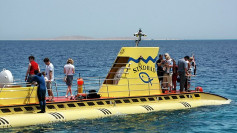Certain countries around the world are known for being stunning places to visit, and in truth, those countries often have a huge reliance on people from other countries visiting and spending their money in order to keep their economy thriving.
Even with a limited understanding of economics, it is easy to see how this could cause problems. For instance, if you understand things like inflation and deflation (explore this article for a definition on "what is deflation?"), you will also see how smaller economies can be susceptible to these issues. To fully understand the impact of tourism on economies, a rough understanding of GDP is also required. This relates to the value of the products and services that a country produces, and their monetary value.
In this guide, we are exploring some of the countries with economies built mainly around tourism (or at least largely reliant on tourism). We have used percentage of GDP as well as other factors, such as the size of the economy, to understand the reliance on tourists. With the economy forecast to grow globally in 2023, many of these figures could also change as time goes on.
Macao
This is one of the smallest economies on the whole list, but according to Statista as well as numerous other sources, it is potentially the most reliant on tourism of any city in the world. The city is close to Hong Kong, and its rich history with both Chinese and Portuguese influence help to create a fascinating venue for a vacation. One of the biggest reasons the economy is reliant on tourism, though, is the fact that it is home to a thriving gambling scene and a lot of Chinese business people visit regularly. It's a bit like the Vegas of the East.
Antigua and Barbuda
Incredible statistics from Antigua and Barbuda suggest that tourism is responsible for as much as 90% of the job market in the country. When you see what the beaches, rainforests and towns in the country look like, this is perhaps not much of a surprise.
The country is situated where the Caribbean meets the Atlantic ocean, and this means some amazing beaches and resorts, a hotspot for yachts, and historic colonial venues that are still in place around the country, allowing people to experience the rich history of the country.
Thailand
Thailand may not be the most reliant on tourism on this list but it is certainly one of the biggest countries to rely on tourism for a large percentage of GDP and jobs, with tourism estimated to be the focus of around 20% of industry in the country.
Thailand is known for both bustling cities and an amazing beach scene, as well as having incredible wildlife and nightlife. No matter what you want to experience on your vacation, the chances are you can find it in Thailand. With a population of around 70 million people, it is estimated that eight million of the residents of the country earn their living in the travel and tourism sectors.
Maldives
Maldives is an archipelago in the Indian ocean and is the smallest country in Asia, as well as being the second least populous.
There are around half a million people in the country and it is estimated that around 50% of the jobs come from the travel and tourism industry.
Maldives is a popular destination for many European travelers as the flight is manageable and there are many package holidays on offer. The crystal-clear seas and white sands are some of the reasons for the popularity of the country.
Aruba
Aruba is another small country with an economy totally built around tourism. The country has an interesting history as it is one of the four countries technically forming part of the Netherlands. The islands of Curaçao and Sint Maarten are also part of the kingdom.
Aruba is quite far south but technically in the Caribbean, and has a hot landscape all year round, with amazing beaches and a huge number of activities and resorts for people to stay in. It is sunny virtually all year round and due to its connection to the Netherlands, it is popular for people from Europe as well as the USA.
Summary
There are many other Caribbean countries that could be included on this list, as well as locations in Asia and even Europe. Tourism is crucial for a lot of countries and even if 10 to 20% of its GDP comes from the industry, it means a country cannot afford to lose its valuable tourists.






